Software engineer interns play a key role in supporting development teams by contributing to coding, debugging, and testing tasks. They gain hands-on experience while learning the ropes of software development in a real-world environment.
The skills required for a software engineer intern include proficiency in programming languages such as Java, Python, or C++, as well as a solid understanding of algorithms and data structures. Additionally, problem-solving abilities and effective communication are crucial for success in this role.
Candidates can write these abilities in their resumes, but you can’t verify them without on-the-job Software Engineer Intern skill tests.
In this post, we will explore 8 essential Software Engineer Intern skills, 9 secondary skills and how to assess them so you can make informed hiring decisions.
Table of contents
8 fundamental Software Engineer Intern skills and traits
The best skills for Software Engineer Interns include Programming Proficiency, Debugging Skills, Version Control, Data Structures, Algorithm Design, Software Testing, Database Management and API Integration.
Let’s dive into the details by examining the 8 essential skills of a Software Engineer Intern.
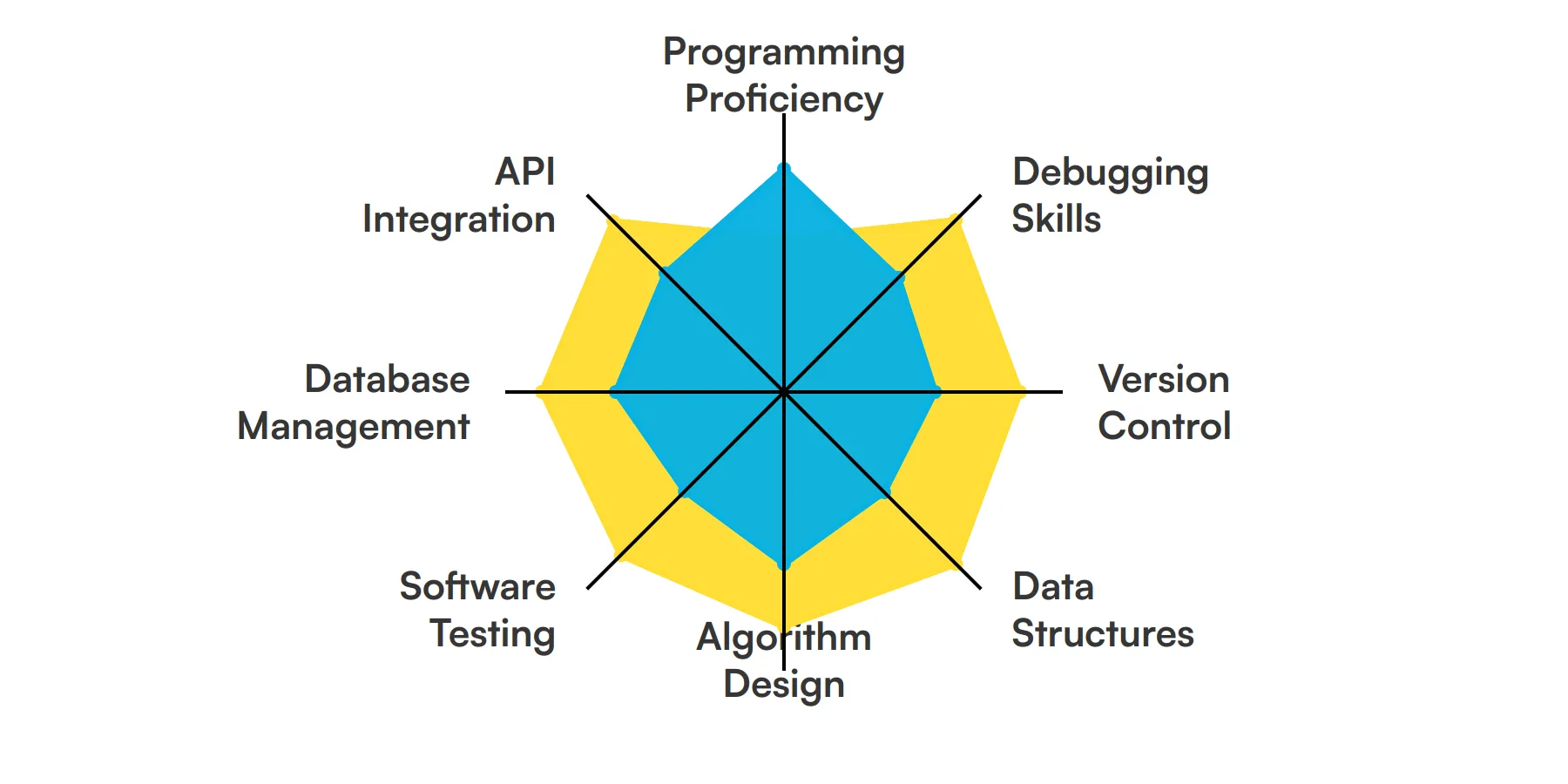
Programming Proficiency
A software engineer intern must be adept in at least one programming language such as Java, Python, or C++. This skill is fundamental as it enables the intern to contribute to codebases, understand algorithmic logic, and participate in software development projects effectively.
For more insights, check out our guide to writing a Software Engineer Intern Job Description.
Debugging Skills
Debugging is critical for identifying and resolving software bugs. A software engineer intern uses this skill to ensure the software operates as intended, enhancing the reliability and performance of applications.
Version Control
Understanding version control systems like Git is necessary for any software engineer intern. This skill helps manage changes to the project codebase, facilitates collaboration with other team members, and maintains a history of project evolution.
Check out our guide for a comprehensive list of interview questions.
Data Structures
Knowledge of data structures is essential for efficient problem solving and data organization. Software engineer interns use this skill to optimize algorithms and ensure data is managed efficiently within applications.
Algorithm Design
The ability to design and implement algorithms is key for software development. It allows the software engineer intern to solve problems systematically and efficiently, which is crucial for building complex software solutions.
Software Testing
Software testing skills are necessary to verify that the software meets all specifications and requirements. A software engineer intern uses these skills to catch bugs early in the development cycle, saving time and resources.
For more insights, check out our guide to writing a Quality Assurance (QA) Engineer Job Description.
Database Management
Familiarity with database technologies such as SQL or MongoDB is important for any software engineer intern. This skill helps in managing data, performing queries, and understanding the backend structure of applications.
API Integration
The ability to integrate and manage APIs is crucial for modern software development. Software engineer interns need this skill to enable different software systems to communicate and work together effectively.
9 secondary Software Engineer Intern skills and traits
The best skills for Software Engineer Interns include Code Review, Agile Methodologies, Problem Solving, Communication Skills, UI/UX Design, Cloud Services, Security Practices, Networking Basics and Documentation.
Let’s dive into the details by examining the 9 secondary skills of a Software Engineer Intern.
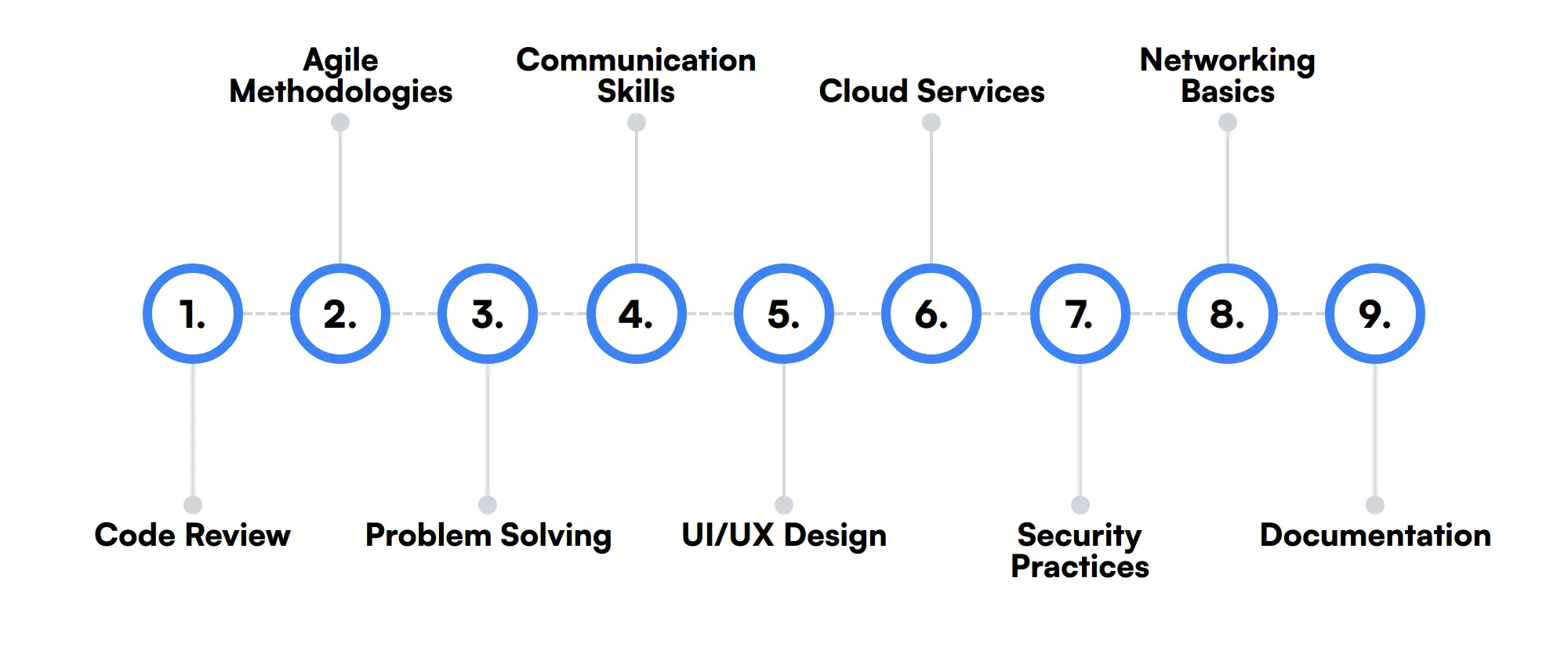
Code Review
Participating in code reviews helps software engineer interns learn best practices and improve coding standards across the team.
Agile Methodologies
Understanding Agile methodologies is beneficial for software engineer interns as it helps them adapt to the fast-paced, iterative development process used in many tech companies.
Problem Solving
Critical thinking and the ability to tackle complex problems directly benefit project outcomes. This skill is often sharpened through real-world development tasks.
Communication Skills
Effective communication is key for software engineer interns to articulate ideas, collaborate with team members, and present solutions clearly.
UI/UX Design
A basic understanding of user interface and user experience design can be advantageous for software engineer interns, especially when working on front-end development tasks.
Cloud Services
Familiarity with cloud services like AWS, Azure, or Google Cloud can provide software engineer interns with the tools to deploy and manage applications at scale.
Security Practices
Awareness of basic security practices is important to protect applications from vulnerabilities and attacks, a skill increasingly necessary in all software development roles.
Networking Basics
Understanding the basics of networking can help software engineer interns troubleshoot issues and understand the infrastructure their applications run on.
Documentation
The ability to write clear and concise documentation is crucial for maintaining code clarity and assisting future developers, including themselves, in understanding the software's functionality.
How to assess Software Engineer Intern skills and traits
When hiring a Software Engineer Intern, it's important to assess not just their knowledge, but how they apply it in real-world scenarios. The key to a successful assessment lies in evaluating both technical skills and personal traits.
Intern candidates often have varying levels of experience, which makes traditional resume screening less effective. Instead, focusing on practical tests and problem-solving exercises can provide a clearer picture of their capabilities. Skills like programming, debugging, and software testing are fundamental, but how an intern approaches a problem and integrates solutions using APIs or manages databases can really set them apart.
To streamline this process and ensure you're not only attracting but also identifying the top talent, consider using Adaface assessments. These tests are designed to mirror actual job tasks, making them an excellent tool for assessing a range of skills from data structures to API integration. By incorporating Adaface assessments into your hiring process, you can achieve an 85% reduction in screening time while improving the quality of your hires.
Let’s look at how to assess Software Engineer Intern skills with these 6 talent assessments.
C Online Test
Our C Online Test evaluates candidates on their fundamental knowledge of C programming, covering a wide range of topics from data types and control statements to more complex concepts like pointers and file handling.
The test assesses their understanding of C programming concepts such as variables, operators, control structures, functions, arrays, and advanced topics like dynamic memory allocation and preprocessor directives.
Successful candidates demonstrate a strong grasp of C programming, including efficient use of pointers, structures, and the ability to manage files and memory dynamically.
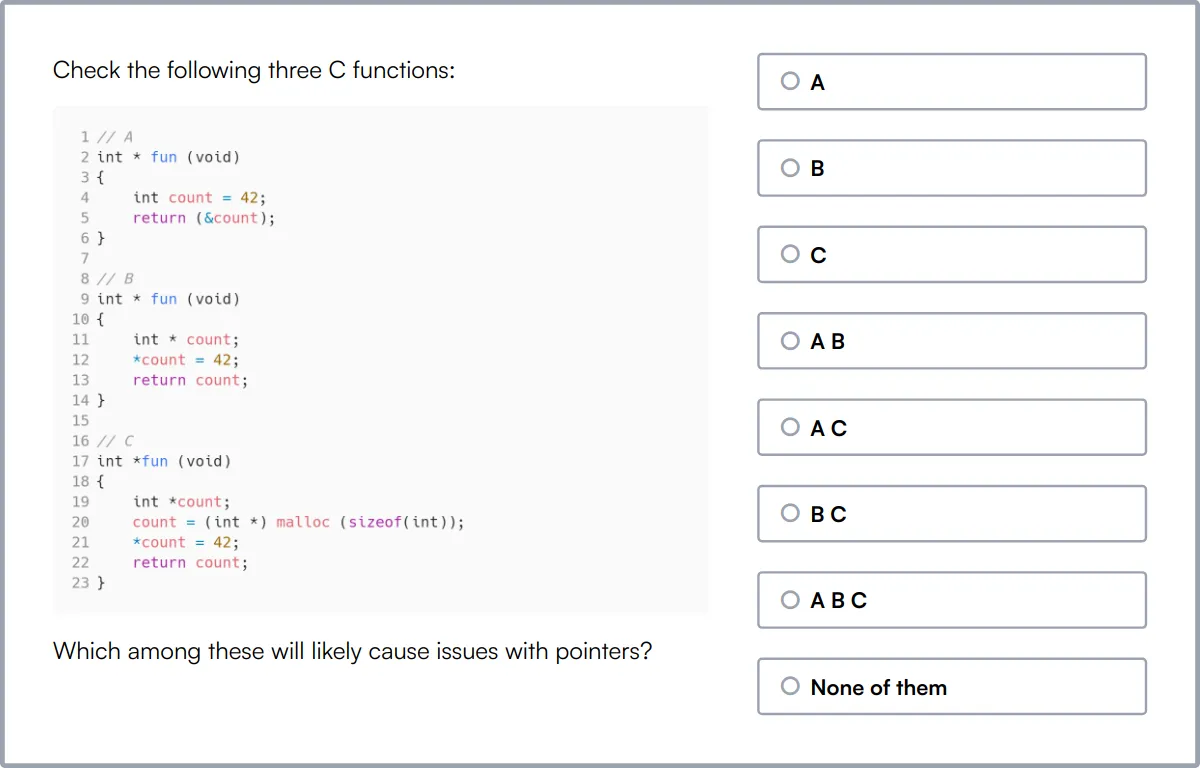
Manual Testing Online Test
Our Manual Testing Online Test assesses a candidate's proficiency in manual software testing, focusing on their ability to design and execute test cases, manage bug reports, and test various software types.
This test evaluates knowledge in areas such as test case writing, test plan development, test strategy, and documentation skills, along with specific testing types like mobile app and penetration testing.
Candidates who excel in this test are adept at creating detailed test plans, executing comprehensive test cases, and effectively managing documentation and bug reports.
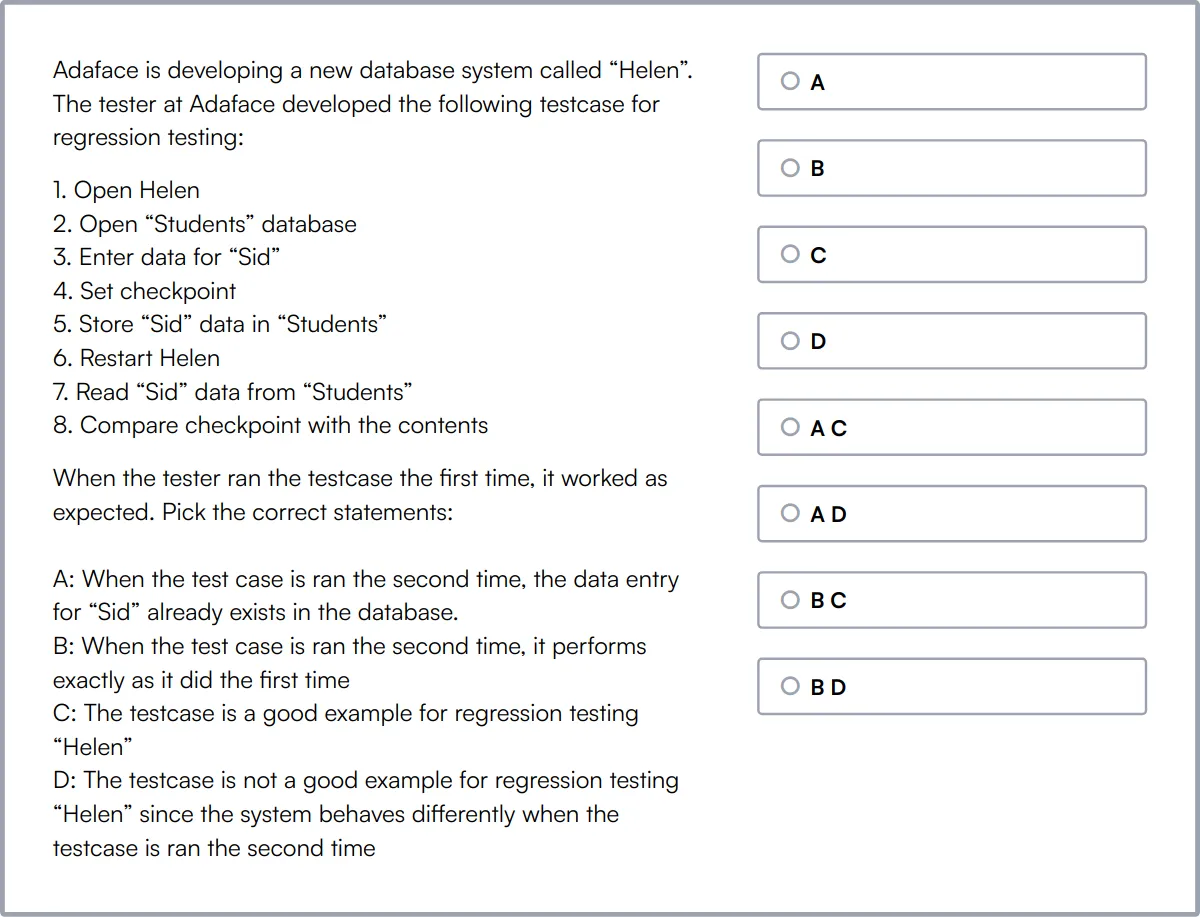
Git Online Test
Our Git Online Test evaluates candidates on their understanding of Git, from basic commands to more advanced practices like branching, merging, and conflict resolution.
The test challenges candidates on their ability to use Git for version control, including repository management, branching models, and handling remote repositories.
High-scoring candidates demonstrate proficiency in managing complex Git workflows, effectively resolving conflicts, and maintaining clean, well-documented repositories.
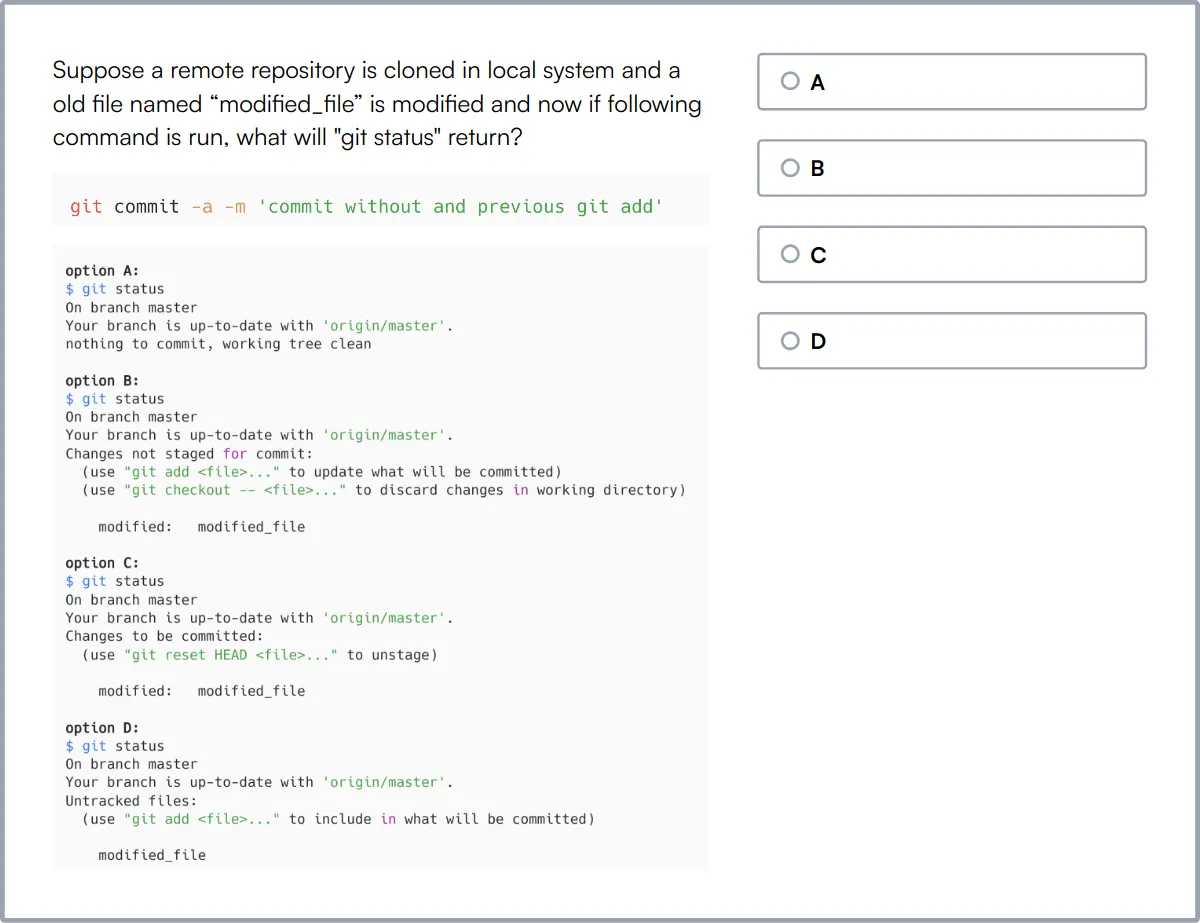
Software Engineering Online Test
Our Software Engineering Online Test assesses candidates on core computer science concepts such as object-oriented programming, database design, and algorithms.
This test evaluates their problem-solving skills through coding questions and their theoretical knowledge in areas like data structures, web development, and software security.
Candidates who perform well on this test show a strong ability to solve complex problems, optimize code, and implement secure and efficient software solutions.
QA Engineer Test
Our QA Engineer Test evaluates candidates on their expertise in quality assurance, focusing on testing fundamentals, test design techniques, and software life cycle.
The test assesses a range of skills from basic testing principles to more specialized areas like Selenium fundamentals, Linux fundamentals, and QA programming.
Successful candidates demonstrate a comprehensive understanding of test automation frameworks, effective test planning, and execution, along with strong skills in Selenium and Linux environments.
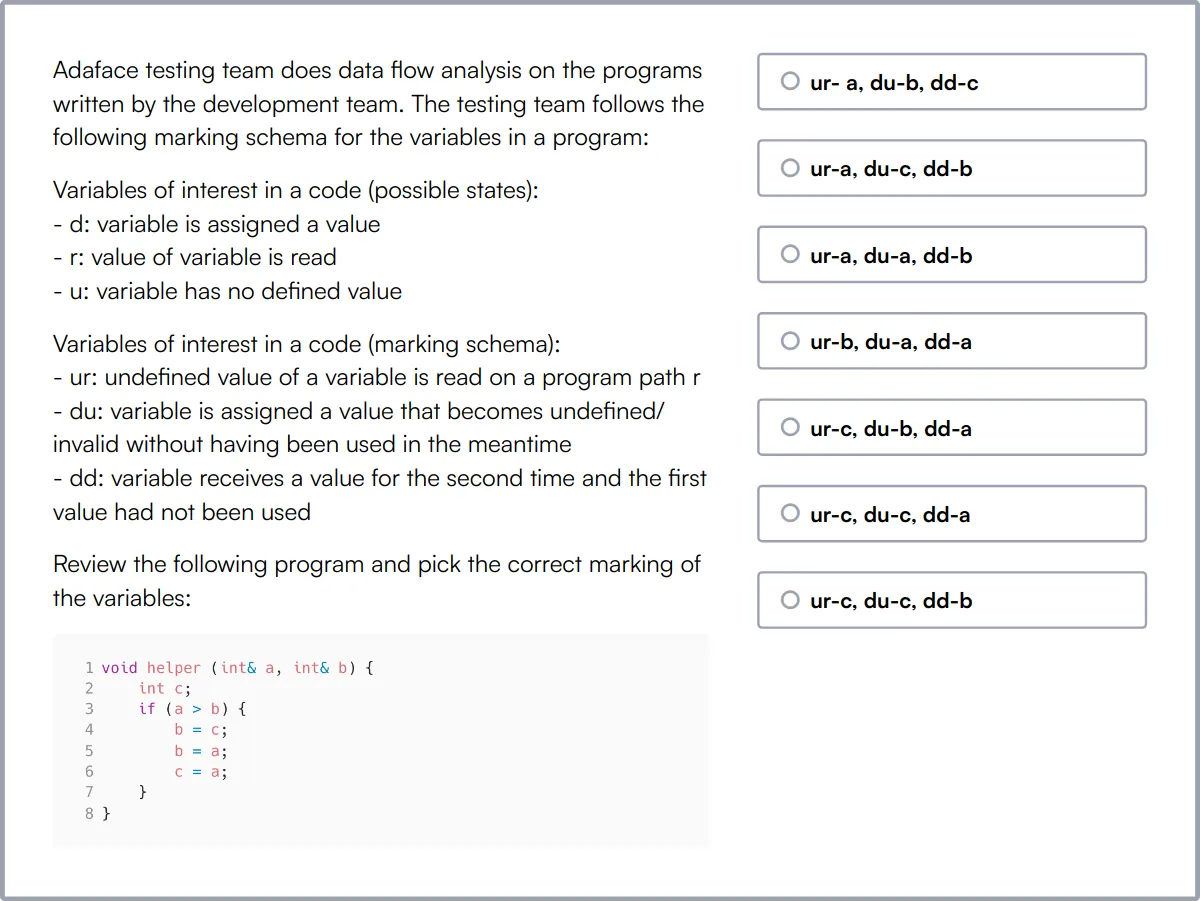
MySQL Online Test
Our MySQL Online Test assesses candidates on their proficiency with MySQL, evaluating their skills in SQL queries, database design, and data manipulation.
This test covers a broad spectrum of database management skills including normalization, indexing, joins, and the use of Data Manipulation Language and Data Definition Language.
Candidates excelling in this test are adept at designing efficient, scalable databases, writing optimized SQL queries, and implementing advanced database features like triggers and stored procedures.

Summary: The 8 key Software Engineer Intern skills and how to test for them
| Software Engineer Intern skill | How to assess them |
|---|---|
| 1. Programming Proficiency | Evaluate candidate's ability to write clean, effective code. |
| 2. Debugging Skills | Assess ability to identify and fix software bugs. |
| 3. Version Control | Check familiarity with tools like Git for code management. |
| 4. Data Structures | Test knowledge of various data structures and their uses. |
| 5. Algorithm Design | Review understanding of algorithm efficiency and problem solving. |
| 6. Software Testing | Examine approaches to testing and ensuring code reliability. |
| 7. Database Management | Assess skills in managing and structuring databases. |
| 8. API Integration | Evaluate ability to integrate and manage APIs in applications. |
Android Online Test
Software Engineer Intern skills FAQs
What programming languages should a software engineer intern be proficient in?
Interns should have a solid grasp of at least one of the major programming languages such as Java, Python, or C++. The choice of language may depend on the specific needs of your projects or the tech stack your company uses.
How can we assess a candidate's debugging skills during the interview?
To assess debugging skills, present candidates with a piece of code containing deliberate errors and ask them to identify and fix the issues. This can be done during a live coding interview or through a take-home assignment.
What is the importance of version control knowledge for software engineer interns?
Version control is key for team collaboration and managing code changes. Interns should understand basic commands and workflows in systems like Git. This ensures they can effectively contribute to projects without disrupting the development process.
How do data structures and algorithm design play a role in the day-to-day tasks of an intern?
Understanding data structures and algorithms is crucial for problem-solving and optimizing code. Interns often use these concepts to improve the efficiency and performance of applications, especially in processing large amounts of data.
What should a software engineer intern know about software testing?
Interns should be familiar with basic testing techniques such as unit testing, integration testing, and system testing. Knowledge of testing frameworks relevant to your tech stack is also beneficial.
Why is it important for software engineer interns to have good communication skills?
Good communication is essential for effectively discussing project requirements, clarifying doubts, and collaborating with team members. It ensures that interns can both seek help when needed and contribute ideas clearly.
How can understanding UI/UX design benefit a software engineer intern?
A basic understanding of UI/UX design helps interns develop more user-friendly applications. It aids in the visual and functional aspects of software development, enhancing the overall user experience.
What cloud services knowledge should software engineer interns possess?
Interns should be familiar with the basics of cloud computing platforms like AWS, Azure, or Google Cloud. This includes understanding how to deploy applications and manage cloud resources, which is increasingly important in modern software development.

40 min skill tests.
No trick questions.
Accurate shortlisting.
We make it easy for you to find the best candidates in your pipeline with a 40 min skills test.
Try for freeRelated posts
Free resources



